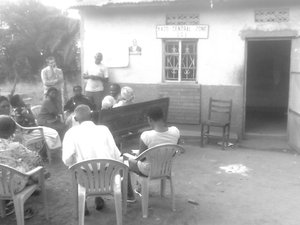Advertisement
Published: January 30th 2013

 UYWEFA
UYWEFA
An early community meeting with UYWEFAThroughout my time here I have watched people, come, go and stay. Apart from the few travellers and purely ‘holiday tourists’, nearly all have been passionate about ‘helping people’ and many have been quite certain about the best way to do that, though few think that they have any ideas at all.
As I have reflected on my own mistakes, it seems you need a unique set of skills to be successful (by success I mean helping people rather than reaching the top) in development.
Be quiet, listen and observe – this is possibly the hardest thing, though it seems the easiest. I have never been around people that have sought or valued my opinion so much. When asked for advice, I would give in to the pressure and offer it, even though often having no idea about the subject I was being asked about in an English context let alone in Uganda. Most of the best things I have seen development workers do in Uganda is to simply reflect back to the community what they have said and done.
Be patient – it is hard to overstate how important this is but many have difficulty grasping the time context in which they are working. I hear people advise “things move more slowly here” but I think it is often that international people are just in a rush. It is interesting to contrast a current UK government funded 12 week programmes (as 12 weeks is the designated British time to solve any social problem) with the local community programmes who couldn’t tell you when they started and when they would end.
Have low expectations, find the silver linings – one of the most frequent complaints I hear is that, “I don’t feel as though I’ve achieved anything” or “I feel useless”. It is quite likely that you won’t and you will be in some respects but that is not the point. When asked, most will say they didn’t expect anything from their experience and this would include me. I now know, though, that I was lying to myself and to not expect anything is probably impossible. What is perhaps more realistic is to expect very little to change. Picking up on tiny successes is key to making progress and to prevent you from becoming despondent. I remember in my first month volunteering we were visiting houses to do ‘research’ and I felt as though we were ‘achieving’ nothing. One of our research questions was whether the house had mosquito nets. One had a surplus, one had none; we took one to the other. I held onto this as my sole tangible ‘achievement’ of a month’s work and almost convinced myself to be satisfied.
Don’t take offence – in my experience it is highly likely that you will be told that you (and most people in your country) have lots of money and that community people come when a Muzungu is around. You can at times feel like a walking sandwich board with notes stuck to you. It’s also my experience that most comments that I’ve found offensive have a degree of truth to them. When they don’t, they are borne of ignorance rather than nastiness and are largely less offensive. I think most volunteers make similar generalisations, though are less likely to say it aloud. I actually find it quite refreshing that stereotypes are so out in the open; if you take it heart you’ll have an angry or upsetting stay.
Advertisement
Tot: 0.121s; Tpl: 0.018s; cc: 9; qc: 45; dbt: 0.0737s; 1; m:domysql w:travelblog (10.17.0.13); sld: 1;
; mem: 1.1mb

 UYWEFA
UYWEFA